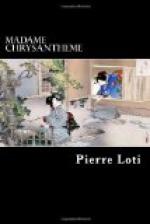But there is neither sadness nor horror in these Japanese sepulchers; it would seem as if among this frivolous and childish people, death itself could not be taken seriously. The monuments are either Buddhas, in granite, seated on lotus, or upright funereal stones with an inscription in gold; they are grouped together in little enclosures in the midst of the woods, or on natural terraces delightfully situated, and are generally reached by long stairways of stone carpeted with moss; from time to time, these pass under one of the sacred gateways, of which the shape, always the same, rude and simple, is a smaller reproduction of those in the temples.
Up above us, the tombs of our mountain are of so hoary an antiquity that they no longer alarm any one, even by night. It is a region of forsaken cemeteries. The dead hidden away there have long since become one with the earth around them; and these thousands of little gray stones, these multitudes of ancient little Buddhas, eaten away by lichens, seem to be now no more than a proof of a series of existences, long anterior to our own, and lost forever and altogether in the mysterious depths of ages.
XXII.
Chrysantheme’s meals are something indescribable.
She begins in the morning, when she wakes, by two little green wild plums pickled in vinegar and rolled in powdered sugar. A cup of tea completes this almost traditional breakfast of Japan, the very same Madame Prune is eating downstairs, the same served up to travelers in the inns.
During the course of the day the feeding is continued by two little dinners of the drollest composition. They are brought up on a tray of red lacquer, in microscopic cups with covers, from Madame Prune’s apartment, where they are cooked: a hashed sparrow, a stuffed prawn, seaweed with a sauce, a salt sweetmeat, a sugared chili. Chrysantheme tastes a little of all, with dainty pecks and the aid of her little chopsticks, raising the tips of her fingers with affected grace. At every dish she makes a face, leaves three parts of it, and dries her finger-tips after it in apparent disgust.
These menus vary according to the inspiration which may have seized Madame Prune. But one thing never varies, either in our household or in any other, neither in the north nor in the south of the Empire, and that is the dessert and the manner of eating it: after all these little dishes, which are a mere make-believe, is brought in a wooden bowl, bound with copper,—an enormous bowl, fit for Gargantua, and filled to the very brim with rice, plainly cooked in water. Chrysantheme fills another large bowl from it (sometimes twice, sometimes three times), darkens its snowy whiteness with a black sauce flavored with fish which is contained in a delicately shaped blue cruet, mixes it all together, carries the bowl to her lips, and crams down all the rice, shoveling it with her two chopsticks into her very throat. Next the little cups and covers are picked up, as well as the tiniest crumb that may have fallen upon the white mats, the irreproachable purity of which nothing is allowed to tarnish. And so ends the dinner.




